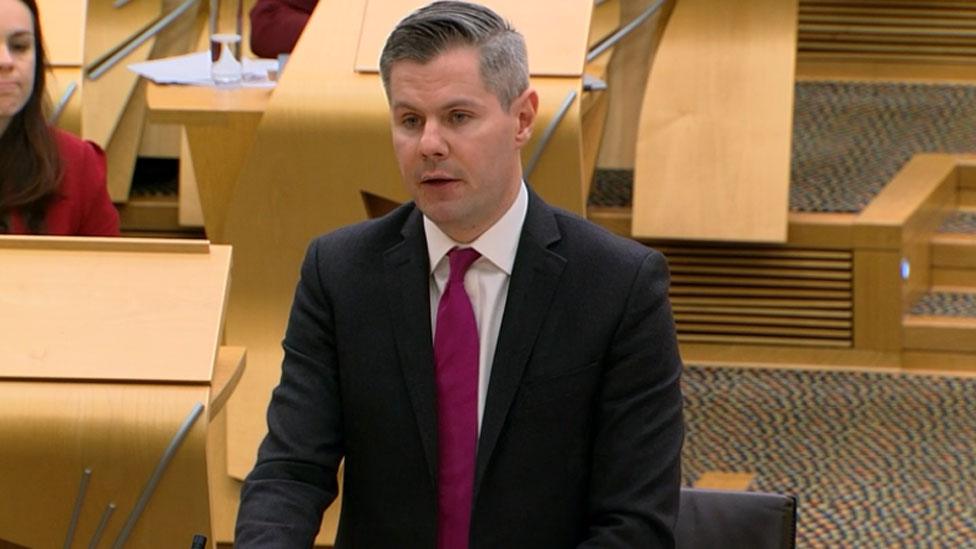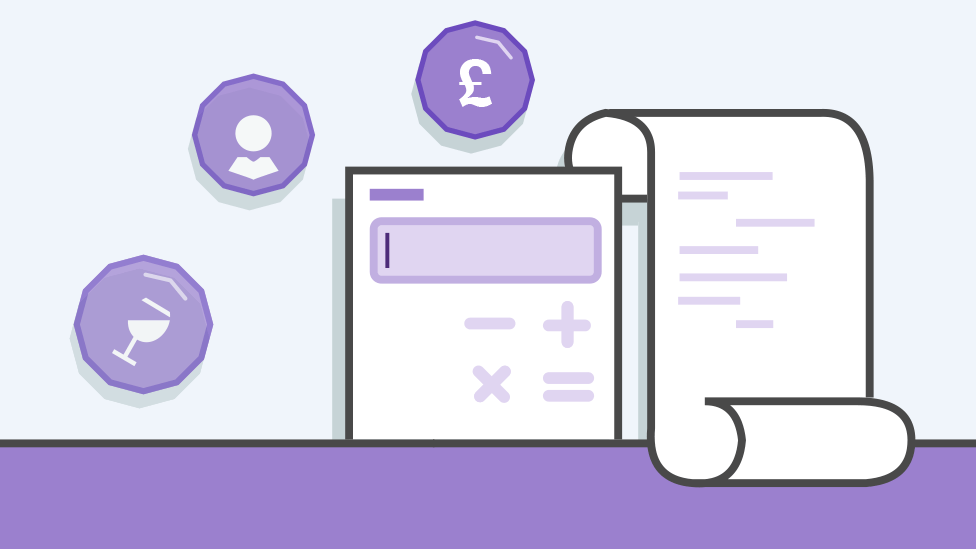Scottish income tax - What you pay and how it compares to rest of UK
- Published

Scotland's Finance Secretary Derek Mackay has revealed what he wants to do with income tax in 2019-20. Will you be paying more or less? Tax consultant Deloitte has put together examples spanning different salaries.
The lower earner
£15,000 salary
If you earn a salary of £15,000 in 2019/20 and have no other income, the personal allowance of £12,500 will be deducted and £2,500 will be taxable.
If you are resident in Scotland, your income tax calculation will be as follows;
Scottish starter rate - £2,049 at 19%= £389.31
Scottish basic rate - £451 at 20% = £90.20
Total tax = £479.51
This is a decrease of £130.49 compared to 2018/19 due to the increase in the personal allowance (decided by the UK government) from £11,850 to £12,500 and an increase in the starter rate band.
If you earned the same sum of money but were not resident in Scotland the full £2,500 would be taxable at 20% (UK basic rate) producing an income tax bill of £500. Therefore, you would pay £20.49 less as a resident of Scotland.
The medium to higher earners
£33,000 salary
If you earn a salary of £33,000 in 2019/20 and have no other income, the personal allowance of £12,500 will be deducted and £20,500 will be taxable. If you are resident in Scotland your income tax will be as follows:
Scottish starter rate - £2,049 at 19% = £389.31
Scottish basic rate - £10,395 at 20% = £2,079
Scottish intermediate rate - £8,056 at 21% = £1,691.76
Tax total = £4,160.07
If you were resident elsewhere in the UK, the full £20,500 would be taxable at 20%, giving an income tax liability of £4,100. A Scottish resident would pay an additional £60.07 in income tax compared with living elsewhere in the UK.
£50,000 salary
If you earn a salary of £50,000 in 2019/20 and have no other income, £37,500 will be taxable after deduction of the £12,500 personal allowance.
If you are resident in Scotland, the tax calculation will be as follows;
Scottish starter rate - £2,049 at 19% = £389.31
Scottish basic rate - £10,395 at 20% = £2,079
Scottish intermediate rate - £18,486 at 21% = £3,882.06
Scottish higher rate - £6,570 at 41% = £2,693.70
Total tax = £9,044.07
This is a decrease of £139.93 compared to 2018/19 due to the increase in the personal allowance from £11,850 to £12,500 combined with the small increases in the starter and basic rate bands and the reduction in the intermediate rate band.
If you were not resident in Scotland, the full £37,500 will be taxable at 20% (UK basic rate) producing an income tax bill of £7,500. You would therefore be paying £1,544.07 more in tax as a resident of Scotland.
The higher earner
£200,000 salary
If you earn a salary of £200,000 in 2019/20 and have no other income you are not entitled to a personal allowance because your income exceeds £125,000. The taxable income is therefore £200,000.
If you are a resident in Scotland, your income tax breaks down is as follows:
Scottish starter rate - £2,049 at 19% = £389.31
Scottish basic rate - £10,395 at 20% = £2,079
Scottish intermediate rate - £18,486 at 21% = £3,882.06
Scottish higher rate - £119,070 at 41% = £48,818.70
Scottish additional rate - £50,000 at 46% = £23,000
Total tax = £78,169.07
This is an increase of £126.57 due to small increases in the starter and basic rate bands combined with a reduction in the intermediate rate band.
If you are a resident elsewhere in the UK, on this salary you would pay £75,000 in tax - £3,169.07 less than north of the border.

Scottish income tax explained
John Macintosh, Tax Partner at Deloitte, said: "According to the Scottish Finance Secretary, the changes announced in the income tax bands will mean that 99% of Scottish resident taxpayers will pay no more tax than in 2018/19.
"This is as a result of the combination of the increase in the personal allowance (which applies to the whole of the UK) and the changes in the Scottish bands."
"Whilst the 19% and 20% bands will be increased for 2019/20, (19% band from £2,000 to £2,049 and 20% band from £10,150 to £10,395) the higher rate threshold has been frozen at £43,430, which means that the 21% band has reduced from £19,430 to £18,486."
"Those with income under the higher rate threshold will see a tax saving compared to 2018/19. This will mainly come from the personal allowance reduction, for example the individual with income of £15,000 will see a tax reduction of £130.49; this is made up of a personal allowance saving of £130 and the small increase on the 19% band of 49 pence.
"Those with income between £43,430 and £123,700 will see a reduction of £139.93 compared to 2018/19 figures. The saving from the increased personal allowance (and the small increases in the 19% and 20% band) exceeds the reduction brought about by the shrinking of the 21% band.
"For those whose personal allowance is tapered away, ie with income over £125,000 there is an increase in tax payable of £126.57 as a result of the 21% band reduction, slightly offset by the small increases in the 19% and 20% bands.
"It is worth noting that if you earn more than £26,993 your tax liability would be more as a Scottish resident than someone living in the rest of the UK. This compares to £26,000 in 2018/19."
The Budget Calculator, devised by Deloitte LLP, is indicative and should not be used to calculate actual liabilities, determine any financial strategy or as a substitute for professional advice.
- Published12 December 2018

- Published10 December 2018

- Published21 February 2019

- Published11 March 2020
